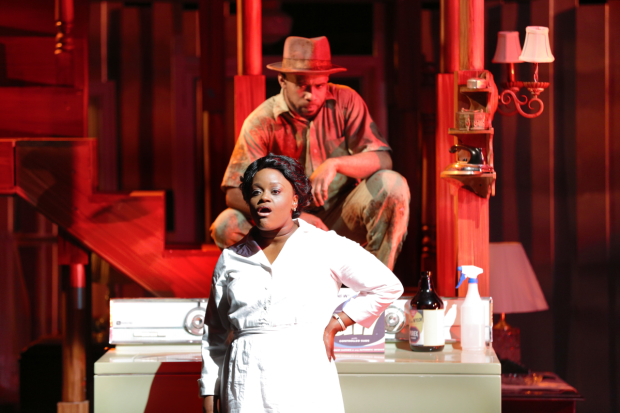Caroline, or Change

(© Grace Toulotte)
Right from the start, you know you're in a whimsical, poetic world with Caroline, or Change, the 2004 Broadway musical currently receiving an excellent production at Round House Theatre. There are five anthropomorphic characters (the Washing Machine, the Dryer, the Radio, the Bus, and the Moon) played by six actors. And, though the characters don't speak in literal poetry, they do sing the lyrics of Tony Kushner to the music of Jeanine Tesori. The book, written by Kushner, explores the racial and class systems of the South in the early 1960s. The musical is set in Lake Charles, Louisiana, in 1963. It centers around a Jewish family, the Gellmans, and their African-American maid, Caroline Thibodeaux.
Caroline is stoic and withdrawn, seemingly suffering from an internal pain she won't share with anyone. Even her best friend, Dotty, can't figure out what is wrong with her. The 8-year-old son of the people she works for, Noah, thinks she is the strongest person in the world. He idolizes Caroline, particularly since his mother has died and he can't bond to his new stepmother, Rose. He begs to be able to light the one cigarette Caroline allows herself each day.
Gradually Caroline reveals herself. She resents being 39 and still a maid, with never enough money for her children. She has two young sons and a teenage daughter living at home. She loved her husband until he started drinking and came home to beat her up every night. Now she works for people who have far more money than she will ever have, and what more cause for despair does she need? She gets it on a November day when it is announced that President Kennedy has been shot. From then on, things begin to change for Caroline.
Nova Y. Payton is sensational in the title role. It is a difficult part, as Caroline has no lines or songs that might endear her to the audience. Instead, she must win their praise strictly with her no-nonsense attitude to Noah and his pocket change, which he leaves in his jeans each day.
Payton's voice soars in her Act 2 number "Lot's Wife," in which she rebukes herself for speaking "my hate to a child" and ends begging the Lord to set her free. Griffin McCahill is an effective foil for Caroline as the adoring Noah. Naomi Jacobson and John Lescault are good as the conventional grandparents. They are particularly funny in "The Chanukah Party" scene where Rose's father (Scott Sedar) argues politics.
Dorea Schmidt creates the necessary sense of loneliness as Rose, whose new husband, Stuart, can't cope with the world after his first wife's death. Will Gartshore is perfectly remote as Stuart, who obsessively plays his mournful clarinet. Korinn Walfall is equally fine as Caroline's daughter, Emmie, who makes it very clear that she intends to have the material things she wants. Her "I Hate the Bus" is a clever tribute to independence and determination. Awa Sal Secka is bright and optimistic as Caroline's friend, Dotty.
Theresa Cunningham is excellent as the Washing Machine, her voice as strong as Payton's as she reminds Caroline that she can't put on airs with her employers. Dressed in a light-green dress to match what used to be called the "avocado"-colored washer and dryer (costumes by Frank Labowitz), her hair in curlers, the Washing Machine serves as one of Caroline's best friends. V. Savoy Mcllwain does double duty as the Dryer and the Bus. His long, mournful announcement of Kennedy's death is stunning. Three women portray the Radio: Felicia Curry, Olivia Russell, and Kara Tameika Watkins. Dressed in sexy beige spangled dresses and high heels, they dance together like the Supremes, sashaying and offering their advice to Caroline like a modern Greek chorus. Delores King Williams sings graceful torch songs as the Moon, standing high above the action.
Director Matthew Gardiner keeps the pace lively, emphasizing the generous amounts of humor in the show. Tesori's music is unique and varied, incorporating quite a bit of klezmer into the primarily jazz and blues score. At various moments, like the numbers "The Bus" and "JFK," when five characters sing together, it is easy to see how Kushner first started this musical as an opera.
Jason Sherwood's set shows the home where the Gellmans live. One side reveals a wide rectangular view showing a first floor and an upper floor for Noah's bedroom. When the turntable begins to revolve, the narrow basement where Caroline works is revealed. A chair representing Caroline's home is shown nearby. Behind the Gellman's house is a white picket fence. On a balcony behind the fence stage left sits the 10-person orchestra, directed by Jon Kalbfleisch, which uses the full original orchestration.
This Caroline is a great reminder of how Americans try hard to understand history — especially negative history. It may be a long while before another musical comes along that tries to take on economic imbalance, civil rights, and relations between African-Americans and Jews in the American South.










